Student Union
Student Learning Goes Up When Devices Shut Down
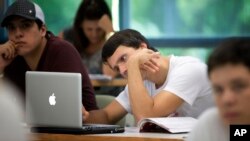
More college professors are pulling the plug on their students.
And they say it’s improving student engagement and attention.
“Over the past eight years, my survey course on Politics and Education in the U.S. at the Harvard Graduate School of Education came to resemble an Internet café more than a classroom," said Martin West of the Harvard University School of Education in Massachusetts.
The revolt was nudged last year by University of Michigan's Susan M. Dynarski, professor of public policy, education and economics, who published, "For better learning in college lectures, lay down the laptop and pick up a pen." Her findings looked at whether modern learning was improved by devices vs. paper and pen, and was published by the Brookings Institution and the New York Times.
"A growing body of evidence says ‘No,’” Dynarski wrote. “When college students use computers or tablets during lecture, they learn less and earn worse grades.”
Test scores improve
Recent evidence includes research from professor Arnold Glass of Rutgers University, who published a study with student researcher Mengxue Kang in July 2018 in the journal Educational Psychology.
Glass looked at 118 Rutgers students taking the same psychology class at different times. The students were permitted to use electronic devices on some days of class but not others.
The students took a short test every day, longer tests every few weeks, and a final exam covering the semester’s material. The daily quiz showed no impact from technology in the classroom. But the results of the longer tests and final exam told a different story: All students performed poorly on material taught while they used technology in the classroom.
Devices divert students
Glass said this shows that electronic devices divert students from processing what’s being taught at the front of the classroom. While students might hear what is taught, if they are shopping or emailing online, they are not really thinking about the subject matter.
And that, Glass said, makes it harder for the information to lodge in their long-term memory.
“Even though a few minutes later they know what the professor said, a week later, if you ask them, all they remember is that they were in class a week ago,” he told VOA. “They no longer remember what the professor said because they eliminated the opportunity.”
When students started bringing laptops to class about 10 years ago, University of Michigan professor Kentaro Toyama, who teaches information technology, thought it was a good idea. He said it could help students take notes or quickly provide information during class discussions.
But then he started noticing troubling behavior.
“Students would be looking at their laptop and they would suddenly smile, and it wasn’t because … there was anything funny happening in the class,” Toyama noted. “What I realized very quickly was … these students … were on social media … and that’s what they were smiling about. And over time, as … this increased, I just felt like I no longer had the attention of my students.”
Students distracted
In Dynarski’s study, even students who could see the screen of a classmate — but not on a device themselves — scored 17 percent lower on comprehension than those who were not distracted.
“It’s hard to stay focused when a field of laptops open to Facebook, Snapchat, and email lies between you and the lecturer,” Dynarski wrote.
So Toyama barred laptops in his classes during lectures. Students could still use technology, but not when he needed their full attention.
After reading Dynarski’s report, Distinguished Professor of Economics at Ohio State University Trevon Logan instituted a ban on devices in his classrooms.
“No laptops, tablets, phones, nothing,” Logan tweeted. “I was curious to see what would happen.”
Student performance improved, especially on the earliest midterms, Logan reported. Average scores improved significantly. But more telling was student reaction.
'Very encouraged'
The policy “encouraged them to focus,” Logan said his students reported to him in class evaluations. It helped them take better notes. Kept them engaged. And they enjoyed the course more.
“I did not expect this at all. … Everyone who talked about it enthusiastically endorsed it.”
“I thought I would get much more pushback on this from students, and I didn’t think student outcomes would be so significant. Given these results, I’m very encouraged to continue with the policy.”
“As more universities (including @OhioState) roll out iPads and tablets to all students, we need to think long and hard about whether and how this technology will be beneficial. It does works in some settings, it doesn’t work in others.”
See all News Updates of the Day
- By VOA News
Tips for international students battling homesickness
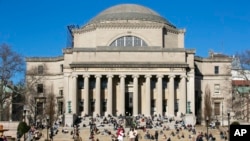
Homesickness can be common among college students.
Here, an article from the student newspaper at Southern New Hampshire University tells international students how to combat it. (November 2024)
- By VOA News
International students help create, support US jobs, research finds
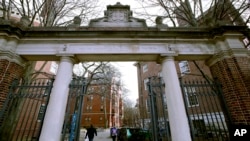
An article from The PIE, which focuses on the international education sector, takes a look at the effect international students have on the U.S. economy.
It finds that international students support some 378,000 jobs in the U.S.
Read the full story here. (November 2024)
- By VOA News
India tops China in sending students to the US, experts say
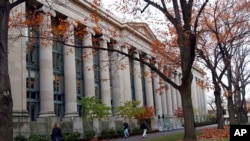
Indians have surpassed Chinese as the largest international student group in the U.S., experts say.
It's the first time it's happened since 2009, NBC News reports, and experts say it's partly due to the lingering effects of COVID. (November 2024)
- By VOA News
Record 1.1 million international students in US, report finds
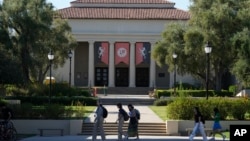
The U.S. has set a new record for international students, hosting more than 1.1 million students during the 2023-24 academic year, a new report says.
That's according to Boundless, which says its mission is "to empower every family to navigate the immigration system more confidently, rapidly and affordably."
Read the full story here. (November 2024)
- By VOA News
Nigeria ranks No. 1 among African countries sending students to US
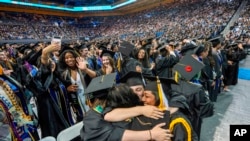
Nairametrics, an African news website, says that Nigeria has become the No. 1 African country sending students to the U.S.; worldwide, it's No. 7.
Read the story here. (November 2024)






